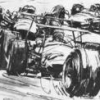Edited by FlyingSaucer, 01 September 2024 - 16:48.

Swiss motorsport ban: thoughts (and some hypocrisy)
#1

Posted 30 August 2024 - 20:17
Advertisement
#2

Posted 30 August 2024 - 20:30
Edited by LittleChris, 30 August 2024 - 20:33.
#3

Posted 31 August 2024 - 05:49
Can't say I ever thought about the reason being anything other than the very obvious point that racing was demonstrably far more dangerous back then than events where only one car was on track at a time. Hillclimbs had their share of fatalities, but had nothing compared to Le Mans 1955 , or countless other races involving multiple deaths of participants and spectators.
#4

Posted 31 August 2024 - 08:02
Assessing risk is always a fraught business, because you simply don't have data about what will happen in future. Even today you can look at the handling of risk in racing and almost every decision, macro or micro, is controversial. (See: Racing Comments forum). Go back to the fifties and the danger was so extreme, and the understanding so lacking, that every judgement was a shot in the dark. Add in the reality that politicians react to public outrage, and you can understand the Swiss decision. Basically it was an attempt to prevent an exact replica of what had already happened. Rallies and hill climbs would not launch a 180mph car over a slow moving one into a packed spectator area.
For me, the great lament in the field of safety is that many lives could have been saved in the seventies by the application of simple, familiar technology such as sizeable crush areas beside the driver and fuel tank, and the use of aeronautical fail-safe fuel line connectors. Instead we had the ludicrous mantra that "the drivers know what the risks are".
Edited by Sterzo, 31 August 2024 - 08:03.
#5

Posted 31 August 2024 - 09:13
Knee-jerk political reaction of course, but surely it would have been driven by the terrible loss of innocent spectator lives rather than any concern for the drivers? The horrendous images of Le Mans 1955 would have made a huge impact even then - I cannot imagine the media furore if such a thing happened today.
Circuit racing was the obvious public target whereas rallying was rather off the radar in those days and anyway was pretty mild stuff compared to modern day rallies. Not sure how the hill-climbs missed the ban though.
#6

Posted 31 August 2024 - 09:59
They banned races. Hill climbs are time trials.
#7

Posted 31 August 2024 - 10:04
They banned races. Hill climbs are time trials.
So you reckon just sloppy or hasty parliamentary law drafting then? Could well be. Does anyone know how quickly the ban came into legal force?
#8

Posted 31 August 2024 - 10:06
There was probably some political pressure, but The Times (June 22nd 1955, p14) portrays it as a decision by the AC Suisse, as opposed to the governmental bans imposed in France and Italy.

#9

Posted 31 August 2024 - 10:08
#10

Posted 31 August 2024 - 10:36
Interesting piece by Charles Faroux in The Observer, July 10th 1955, presumably reprinted from one of the French magazines or l'Équipe. Note what he says about promised races for 1956:

#11

Posted 31 August 2024 - 11:07
They banned races. Hill climbs are time trials.
At least in the German language there is no difference. Hillclimbs are "Bergrennen".
Likewise in French: "Course de Côte".
If "Rennen" resp. "Courses" were banned it would include hillclimbs.
If "Rundstreckenrennen" were banned the ban would refer only to races on circuits - excluding hillclimbs.
#12

Posted 31 August 2024 - 11:10
In Italy for thirty years under the Borgias, they had warfare, terror, murder, and bloodshed, but they produced Michelangelo, Leonardo da Vinci, and Enzo Ferrari. In Switzerland, they had brotherly love, they had five hundred years of democracy and peace, and what did that produce? The cuckoo clock.
#13

Posted 31 August 2024 - 11:32
There was probably some political pressure, but The Times (June 22nd 1955, p14) portrays it as a decision by the AC Suisse, as opposed to the governmental bans imposed in France and Italy.
That looks like the immediate reaction of the AC Suisse but it must have been followed by some legislative action, since that had to be rescinded by the Swiss parliament before recent racing could take place. I wonder when that happened?
The linguistic distinctions mentioned above may be factors, although I am not sure in what language(s) the Swiss legislate? German is very definite in meaning, whereas French can be suitably vague - hence it was traditionally known as the language of diplomacy where two parties could agree on wordings whilst not actually meaning the same thing.
#14

Posted 31 August 2024 - 16:46
Several have touched on this already, but the decision by the Swiss club to cancel and then eventually ban circuit motor racing events took place within a context that included other aspects than the Le Mans disaster.
Keep in mind that in May, both Alberto Ascari and Bill Vukovich died (remember them?), one in a testing accident and the other in the 500-mile race itself at Indianapolis, and then came Le Mans right on the heels of those deaths.
Then, in early August, the American Automobile Association announced that its Contest Board would cease operations as of 31 December 1955. Not to mention no end politicos in the USA and elsewhere looking to put motor racing's head on a platter.
And, motor racing was guilty as charged when it came to being dangerous, some of that being known and some of that due to really not understanding or knowing how to make it safer (the USA tended to lightyears ahead of Europe with helmets, seatbelts, et cetera, but that is also only in a relative sense).
Any hypocrisy with the motor sport establishment was carrying on in the Netherlands and Britain and even Italy as if anything happened at Le Mans that needed to be addressed. Not presentism given that one can find more than a few pointing out the legitimate dangers of motor sport at the time.
Much of this goes back the L.P. Hartley admonition of, "The past is a foreign country: they do things differently there." And, "differently" does not necessarily connote better in many instances.
In retrospect, Le Mans 1955, the 1957 Mille Miglia, Moss at Goodwood in 1962, and no end of countless other crashes worldwide, both fatal and otherwise only "injuring" drivers and spectators, were, if not inevitable, certainly probable.
Ignoring the context of the Swiss decision is actually easy to do these days, I guess.
#15

Posted 31 August 2024 - 17:23
Wikipedia says:
1955 wurde die Durchführung von öffentlichen Rundstreckenrennen in der Schweiz gesetzlich untersagt (Artikel 52 des Schweizer Straßenverkehrsgesetzes). Das Verbot betraf Rundstreckenrennen, da bei diesen Wettbewerben mehrere Fahrzeuge gleichzeitig und in direktem Wettkampf gegeneinander fahren, also Kollisionen wie in Le Mans möglich sind.
Andere motorsportliche Veranstaltungen, insbesondere Bergrennen und Rallyes, blieben erlaubt. Das Verbot galt für Rundstreckenrennen, zu denen Zuschauer zugelassen sind; von ihm ausgenommen waren Rennen mit „besonderen Fahrzeugen“ wie Karts, sofern diese einen Hubraum von 250 cm³ nicht überschritten (vor dem 1. März 2006 galt eine Höchstgrenze von 100 cm³), sowie Rasenrennen mit Motorrädern, Geschicklichkeits-Wettfahrten im Gelände und Autoslaloms. Stockcar-Veranstaltungen waren verboten.
Per 1. April 2016 hat der Bundesrat die Zulassung von Rundstreckenrennen für Elektroautos n der Schweiz beschlossen. Die Durchführung eines solchen Rennens bedarf einer Bewilligung und ist zusätzlich noch an weitere Bedingungen betreffend Verkehrssicherheit geknüpft. Auf der Rennstrecke in Zürich and im Juni 2018 zum ersten Mal seit 1955 wieder ein Schweizer Rundstreckenrennen statt. Am 22. Juni 2019 wurde auf der Formel-E-Rennstrecke Bern ein weiteres Rennen der FIA-Formel-E-Meisterschaft n der Schweiz ausgetragen.
Am 31. Mai 2022 wurde das Verbot von Rundstreckenrennen durch Zustimmung des Ständerats in der Schweiz abgeschafft.
Translation (mostly by Babelfish):
In 1955, the holding of public circuit races in Switzerland was prohibited by law (Article 52 of the Swiss Road Traffic Act). The ban affected circuit racing, as in these competitions several vehicles race against each other at the same time and in direct competition, meaning collisions like those at Le Mans are possible.
Other motorsport events, particularly hillclimbs and rallyes, remained permitted. The ban applied to circuit races to which spectators are admitted; excluded from this were races with “special vehicles” such as karts, as long as they did not exceed a displacement of 250 cm³ (before March 1, 2006, a maximum limit of 100 cm³ was applied), as well as lawn races with motorcycles, off-road skill competitions and car slaloms. Stock car events were banned.
On April 1, 2016, the Federal Council decided to allow circuit racing for electric cars in Switzerland. The holding of such a race requires a permit and is also linked to further conditions regarding traffic safety. A Swiss circuit race took place on the race track in Zurich in June 2018 for the first time since 1955. On June 22, 2019, another race of the FIA Formula E Championship in Switzerland was held at the Formula E race track in Bern.
On May 31, 2022, the ban on circuit racing was abolished in Switzerland with the approval of the Council of States.
#16

Posted 31 August 2024 - 18:27
Thank you ReWind for finding that information which answers all of the questions raised above.
#17

Posted 31 August 2024 - 18:47
I also recall a writer (sorry, I forget who or where, Daley?) that rather dismissively stated that the ban was inconsequential as Bremgarten was the only true circuit in the country. And, yes, I'm aware there were several street circuits in Switzerland in the pre and post-WWII era, I'm just passing along an interesting quote made within a few years of the decision.
#18

Posted 31 August 2024 - 19:19
Christopher W.
#19

Posted 31 August 2024 - 19:25
It's well beyond my schoolboy German, but I do wonder if Wikipedia is simplifying things somewhat. The current version of the law can be found here: https://www.parlamen...210080/N1 D.pdf
However, it dates from 1958 - in force from October 1959 - and was a revised version of a 1932 consolidation of various previous cantonal concordats.
https://de.wikipedia...nverkehrsgesetz
So the ban was presumably introduced as a revision of that previous law - the Bundesgesetz über den Motorfahrzeug- und Fahrradverkehr. That original law is available at Fedlex, but I don't see any way of finding any alterations to it. https://www.fedlex.a...1_610_617_95/de
Automobil Revue presumably published the exact details at the time?
Advertisement
#20

Posted 31 August 2024 - 20:08
and their government in particular, were still regarded by many as suspect and inhumane when their treatment and shocking abuse of allied POWs and downed American air crew in particular, had only recently become public knowledge. I suspect that the Swiss government took advantage of those events at Le Mans, to show the world that the Swiss were sufficiently compassionate to “sacrifice“ a popular sport for humane reasons.
Christopher W.
"We are going to show how fair and democratic we are by banning joy."
#21

Posted 31 August 2024 - 23:26
I also recall a writer (sorry, I forget who or where, Daley?) that rather dismissively stated that the ban was inconsequential as Bremgarten was the only true circuit in the country. And, yes, I'm aware there were several street circuits in Switzerland in the pre and post-WWII era, I'm just passing along an interesting quote made within a few years of the decision.
You may be thinking of Denis Jenkinson in his book A Story of Formula 1. He wrote that the Bergomasters of Berne had wanted for several years to stop races there but had been unable to do so because of a legal document that allowed racing on one weekend a year. When the Swiss government announced a ban after Le Mans there was little opposition.
#22

Posted 01 September 2024 - 01:58
You may be thinking of Denis Jenkinson in his book A Story of Formula 1. He wrote that the Bergomasters of Berne had wanted for several years to stop races there but had been unable to do so because of a legal document that allowed racing on one weekend a year. When the Swiss government announced a ban after Le Mans there was little opposition.
No, because I haven't read that book ![]() I think Daley because of the layout of his book "Cars at Speed", had chapters country-by-country looking at the circuits and history. That it was written dismissively also comes off a bit more like Daley (not that Jenks couldn't).
I think Daley because of the layout of his book "Cars at Speed", had chapters country-by-country looking at the circuits and history. That it was written dismissively also comes off a bit more like Daley (not that Jenks couldn't).
#23

Posted 01 September 2024 - 09:04
The 1955 Le Mans tragedy ranked alongside civil disasters like earthquakes and hurricanes and floods in terms of impact and loss of life.
Yes, this was a catastrophe. At least 80 people (all spectators apart from driver Levegh) died and and at least 120 were injured, although some accounts put both even higher.
It cannot be equated to the death of yet another racing driver in a crash, because it was almost entirely innocent bystanders who were killed or injured. It is hard to imagine now the impact of this tragedy on public opinion worldwide. In this case, the accident was filmed and footage was widely seen in newsreels and early TV. There were immediate bans in France, Spain, Germany and of course Switzerland although the first three were seeon rescinded.
Were such a calamity to happen today, with omnipresent media coverage, I doubt if motor racing would survive anywhere.
#24

Posted 01 September 2024 - 17:22
it occurred to me that LM is probably the only long running circuit where spectator deaths outnumber driver deaths, over the years of operating.
Not a statistic that any circuit would want to hold
#25

Posted 01 September 2024 - 20:03
Well, Monza probably as well. 20-plus-x spectators killed by Materassi´s car in 1928 and 12 more at von Trips´ crash in 1961. Despite a lot of drivers lost their lives at Monza over the years I doubt the number is higher than 30.
#26

Posted 01 September 2024 - 21:00
In Britain, it appears it was: Crash? What crash? Oh, the crash at Le Mans! Meh, so what? Heavens, we can't let that Continental Nonsense interfere with our sport.
Of course, in fairness, they were joined by a number of other countries as well...
Autosport, 24 June 1955
PANIC MOVES
THE French Government still holds by its decision to ban all organized motoring and motor-cycling sport until new safety regulations have been approved.
This has led to more or less panic moves in other countries: Switzerland proposes to abandon the Berne races, and Spain has announced its intention to cancel Barcelona.
In Italy, Germany and Great Britain more sane counsel prevails.
While agreeing wholeheartedly that safety precautions for spectators must be enforced, these three countries have not announced any absolute ban on racing, a ban which may strike at the entire heart of many industries tied up with the development and publicity side of automobile engineering.
However, Mercedes-Benz, with Press conferences and so on, have done anything but allay the fears of the panic-minded!
Autosport, 8 July 1955
FADING GRAND PRIX HOPES
THE cancellation of the German Grand Prix at Niuburgring on 31st July has come as a severe blow, particularly as it was ,taken for granted that safety precautions are as complete as is possible.
Apparently the main objection is to the narrow width of the road which runs behind the pits, after leaving the abnormally wide straight.
Although the Nurburgring authorities were confident that no objection could be taken to the circuit, ,the Automobilclub von Deutschland decided to abandon the event, despite the fact that a sum exceeding £5,000 was immediately voted to enable any alterations to be carried out.
The A.v.D. maintain that it would not be possible to complete suggested modifications before the date of the Grand Prix.
A decision yet remains to be taken regarding the 1,000 kilometres event in August.·
From Italy comes news that the XXVI Gran Premio d'Italia and the Coppa Inter-Europa race for gran turismo machines will take place on 11th Sep tember as scheduled, on the new circuit at Monza.
With Barcelona still problematical, this means that the Grands Prix of Great Britain and Italy will be the sole remaining grandes epreuves for Formula 1 racing cars.
However, it is still possible that the Grand Prix de l' A.C.F. may be held at Rheims!
Undoubtedly the future of motor-racing is very much in the balance, until such time as new safety regulations are issued by the F.I.A., and approved by the governments of all countries concerned.
ONE final word I feel has to be said on the Le Mans tragedy - that being the fact that Jaguars were very unfortunate in losing a great deal of publicity from a really great performance in this race, and the same remark can be applied to Aston Martin; also to other British makes that finished so hi h in the awards list. Whether the Jaguar would have won if the Mercedes had not withdrawn is one of the "ifs" of motor racing.
My personal opinion-having studied all the race reports-is that they certainly might have done so. In any case they put up a very fine show.
15
Edited by DCapps, 01 September 2024 - 22:43.
#27

Posted 02 September 2024 - 19:58
Of course the Le Mans disaster was ghastly. But only ten years after the end of World War 2 it was ghastly yet widely viewed with the perspective of greater ghastliness multiplied a zillion times having been absolutely commonplace within what was then really very recent memory. Think back to 2014 - does it seem not long ago?
Britannic stiff upper lip was much prized in this country through the 1950s. Keeping matters such as the Le Mans incident "within proper context" came naturally to our contemporary sports writers.
In contrast, the Swiss had escaped the worst effects of WW2 - and some would argue that many had instead benefited greatly from it - so as a nation the public there were not as inured as were the rest of Europe, and the UK, to the impact of such an avoidable mass-fatality incident on their soil. There had in any case always been quite strong Swiss national opposition to a sport potentially as dangerous as motor racing. The first postwar Swiss GP at Berne's Bremgarten circuit in 1947 had seen three spectators struck and killed by competing cars, and that was not forgotten. Eight years later, the Le Mans incident crystallised underlying fears of a mass-fatality repetition, hence gathering momentum for the political decision to ban.
DCN
PS - 'Stiff upper lip' and keeping an incident 'within proper context' are for many much missed attributes today, and attributes they really were.
#28

Posted 02 September 2024 - 21:31
Once upon a time, after Desert One and Grenada, but before Panama, Desert Shield/Storm, and all the rest of what followed, I was asked a question by a class of young Rangers getting ready to join The Regiment.
They asked the Usual Question: What did I feel when I killed someone.
An easy answer and one that I stole from Rocky, a Force Recon guy, that nailed it perfectly.
"The recoil. Next?"
#29

Posted 03 September 2024 - 08:28
PS - 'Stiff upper lip' and keeping an incident 'within proper context' are for many much missed attributes today, and attributes they really were.

#30

Posted 03 September 2024 - 11:09
There is a certain smugness to this, though, again from The Times, August 12th 1955.

I'd also venture to suggest that 'stiff upper lip' perhaps evolved into the slightly less admirable 'British exceptionalism', somewhat typified by Flanders and Swann's 'Song of Patriotic Prejudice' and Paddy Roberts' 'The Englishman is Noted for his Sang-froid', which, like the fictional Alf Garnett and Alan B'Stard, a lot of people seem to have regarded as role models rather than warnings.
#31

Posted 03 September 2024 - 11:13
Reading the report of the 1947 Bremgarten spectator fatalities, the circumstances strike me as very un-Swiss, with a distinct lack of crowd control being the root cause. Certainly nothing like what happened in 1955 at Le Mans.
#32

Posted 03 September 2024 - 18:38
PS - 'Stiff upper lip' and keeping an incident 'within proper context' are for many much missed attributes today, and attributes they really were.
We could ALL use some of this!
#33

Posted 03 September 2024 - 19:24
As early as the 1902 Gordon Bennett Cup race Swiss 'exceptionalism' saw competitive motoring banned within their territory, so the route shared with the contemporarily more significant overall event from Paris to Vienna - of which the GB race was run as far as Innsbruck - had to be neutralised from Swiss entry border to Swiss exit border. National suspicion of such a determinedly individualistic sport as racing motor cars - and such a demonstrably hazardous sport to boot - was deeply ingrained long before 1955 and Le Mans. Vitesse is absolutely right about the lack of adequate crowd control, and lax behaviour, which contributed to the 1947 Bremgarten fatalities, but I remember Swiss-born Jabby Crombac telling me that 'motor racing minded' people there were widely regarded as belonging to a dangerously irresponsible minority, amongst a majority repeatedly crying out for them to be better controlled.
I believe that was contributory reason for Jabby feeling so content with having settled in Paris, where he happily became one of the world's leading motor sports personalities...
DCN
#34

Posted 04 September 2024 - 09:01
Swiss 'exceptionalism'
Switzerland has long been,and remains, a law unto itself.
Refusing to join the fun of two World Wars, only giving women the vote in 1971, only finally joining the UN very recently despite hosting half of the UN's agencies and bodies, refusing adamantly to join the EU or the eurozone but joining the Schengen area.....they do things their own way. and I am not sure that I can blame them for that. This is a country where democracy might actually be a genuine thing, where the voice of the people is heard.
Can anyone name the current President of Switzerland or the Chancellor? Or ANY Swiss President or Chancellor, come to that? (spoiler alert: nor can I)
Edited by BRG, 04 September 2024 - 09:01.
#35

Posted 04 September 2024 - 11:50
Switzerland has long been,and remains, a law unto itself.
Refusing to join the fun of two World Wars, only giving women the vote in 1971, only finally joining the UN very recently despite hosting half of the UN's agencies and bodies, refusing adamantly to join the EU or the eurozone but joining the Schengen area.....they do things their own way. and I am not sure that I can blame them for that. This is a country where democracy might actually be a genuine thing, where the voice of the people is heard.
Can anyone name the current President of Switzerland or the Chancellor? Or ANY Swiss President or Chancellor, come to that? (spoiler alert: nor can I)
Switzerland surely has some odd rules indeed.
But then again when they have had their differencies and when they manage to have a quite good democratic decision it surely or almost surely stays so.
Madame Amherd or more precisely, Viola Amherd is the President of the Swiss Confederation and in a sense, fitting for Switzerland's quite unique country policy it's still not a head of state.
Because, ultimately for Switzerland, under the Swiss Federal Constitution, the Federal Council doubles as a collective head of state and head of government.
Mr. Rossi and more precisely, Viktor Rossi is the Federal Chancellor of Switzerland in these days. Though as a Chancellor of Switzerland, he really has barely any political power since unlike in Germany, Austria and UK, it's more of a political, technocratic honor role appointment though they have power for naming any federal laws.
Publication purposes only mostly. ![]()
Edited by Blue6ix, 04 September 2024 - 11:51.
#36

Posted 08 September 2024 - 02:24
They banned races. Hill climbs are time trials.
As is rallying. And rallying to me is way too dangerous for all involved. And always has been.
I sometimes watch rally crash videos and sooner than later there will be an accident with numerous casualties. Some designated spectator areas are in the stupidest of positions.
#37

Posted 08 September 2024 - 19:09
Rallying is a good deal safer than most motor sport. Even injuries requiring hospital treatment are few and far between. And this is despite an element amongst the spectators who are vying to win a Darwin award.





















